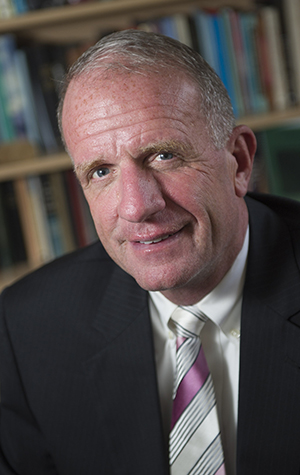Marsh Chapel Dean Defends Gay Marriage
Robert Hill supports Methodist colleague in controversy

An act of love for his child embroiled the Rev. Thomas Ogletree in the culture war over gay rights. The 79-year-old Methodist minister and ex-dean of Yale Divinity School presided over his son’s wedding last fall to another man, violating the United Methodist Church’s ban on its clergy officiating at same-sex marriages. Conservative colleagues of Ogletree are pressing for a canonical trial.
The dean of BU’s Marsh Chapel, also a Methodist, has defended both the man and his message from the pulpit.
“Now the winds of reaction, abetted by the mistaken misguidance of the current general superintendent [Methodist bishop] in New York, are bringing him to trial,” the Rev. Robert Hill told Marsh worshippers earlier this month in a Sunday sermon. Describing Ogletree as “courtly, gracious, soft-spoken,” Hill went on, “The measure of our current failure to live up to the much ballyhooed Methodist tradition of social justice and holiness can no more accurately be taken than by this dark image of Ogletree on trial before Methodism. … It is Ogletree who has brought Methodism to trial, not the reverse.”
Noting that the Upper New York Conference (Methodist jurisdiction) of which he is an elder has lost 11 percent of its members in the last three years, Hill declared, “For those under 45, the disaffection is highly specific. We refuse to affirm the full humanity of gay people. Can we be surprised that people of conscience go elsewhere?”
Churches’ stances on same-sex marriage—Catholicism doesn’t sanction it as well—are not affected by yesterday’s Supreme Court overturning the Defense of Marriage Act, thereby allowing federal benefits for gay married couples. Gay weddings are performed at Marsh by non-Methodist officiants among his 75-person chaplaincy, ministers and staff, Hill said in an interview. The nondenominational chapel, which is not a Methodist church and therefore not under that church’s jurisdiction, hosted about a half dozen same-sex marriages in recent years.
As for performing them himself, “I have not. Yet,” he said with a smile.
“I believe that over time, our denomination will move in the same direction as others have done” to recognize gay marriages. “Gay people are people, not fractions—five-fifths, not three-fifths.”
This sermon was not the first time that Hill, Marsh’s dean since 2006, has preached in defense of gay marriage. A January sermon, And Are We Yet Alive?, faulted his church’s 2012 general conference—attended every four years by global members to write church law—for excluding gay people from marriage and ordination. (An effort to modify to the church’s position on homosexuality failed by a vote of 61 percent to 39 percent). After the conference, Hill said, he spent six months praying and speaking with friends about Methodism’s future. Among its needs, he concluded, was pastoral care for gay people.
He argued that New Testament figures—even St. Paul, who explicitly condemned same-sex relations—supported his view that “gay identity is creation, not fall, God’s gift, not human sin, as is straight identity.” Paul’s Letter to the Galatians, Hill noted, contains the famous line, “In Christ there is neither Jew nor Greek, slave nor free, no male and female.”
“And no gay and straight,” Hill said. He also cited Jesus, who said God cared for even the trivial lilies of the field, and St. John, whose gospel foretold the coming of an “advocate” in the Holy Spirit to help his disciples. That spirit will “lead us out into further truth,” Hill preached, “which is not in that gospel, or even in the Bible.”
“The gospel is about redemption, not about tradition,” he said. “Gospel finally and ever trumps tradition.”
One traditionalist Methodist pastor told the New York Times that he believed Ogletree chose the wrong route for challenging the marriage law: “Rev. Ogletree is acting in a way that is injurious to the church, because it fosters confusion in the church about what we stand for. And it undermines the whole covenant of accountability that we share with each other as pastors.”
Calling the former Yale dean “about the most Christian person I know,” Hill said in the interview that the decision on trying him would be made by his conference’s superintendent. Were he convicted, the sanction would be determined by the canonical court. Given Ogletree’s age, stature, and piety, “My hope is that the general superintendent will simply not bring him to trial.”
Ironically, he said, Ogletree, a scholar of social ethics, wrote “huge swaths” of the Book of Discipline of the United Methodist Church, the law book he’s accused of violating.

Comments & Discussion
Boston University moderates comments to facilitate an informed, substantive, civil conversation. Abusive, profane, self-promotional, misleading, incoherent or off-topic comments will be rejected. Moderators are staffed during regular business hours (EST) and can only accept comments written in English. Statistics or facts must include a citation or a link to the citation.